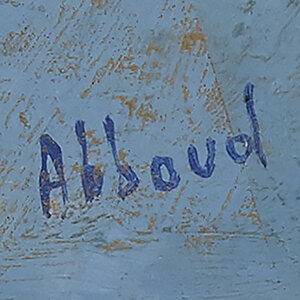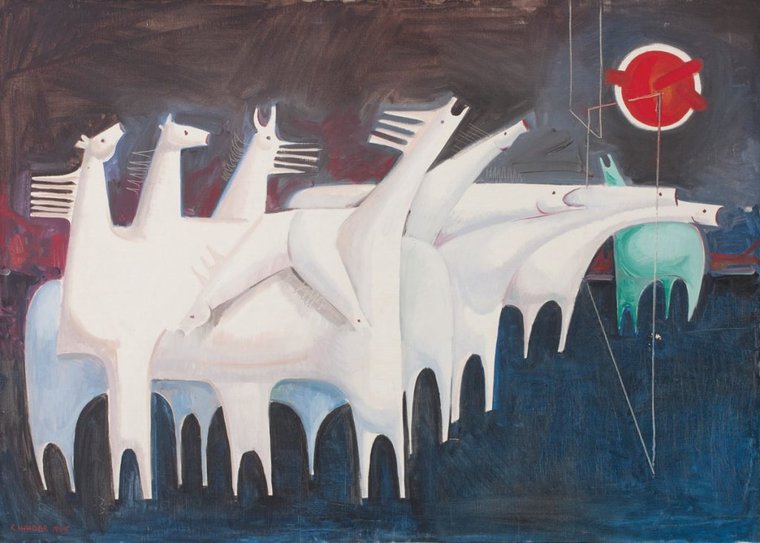


Last updated on Tue 8 November, 2016


First exhibition of Arab modern art to take place in Iran, presented by the Barjeel Art Foundation
The Sea Suspended: Arab Modernism from the Barjeel Collection
8 November – 23 December 2016
Tehran Museum of Contemporary Art (TMoCA), Tehran, Iran
Barjeel Art Foundation will present and curate an exhibition of Arab modern art at the Tehran Museum of Contemporary Art (TMoCA) this November. This historic exhibition will mark the first time a show of Arab art from the modern period will take place in Iran. The exhibition will feature works by modern masters drawn exclusively from the Barjeel Art Foundation collection, and will represent a fifty-year period of works from the 1940s to the 1990s from around the Arab world, including Egypt, Iraq, North Africa, the Levant, and the Arabian Peninsula.
Majid Mollanorouzi, Director of Tehran Museum of Contemporary Art (TMoCA), said:
“Art is important in that it allows experiences to be shared, even across the boundaries of language or culture. This is even more significant when we work together with organisations from the region, such as the Barjeel Art Foundation. Hosting this diverse collection of Arab art and exhibiting it to the Iranian public will allow us to share the region’s modern heritage. It also allows for a unique dialogue between two institutions that hold a common passion for bringing art to the public, which we hope will continue.”
Karim Sultan, Curator of the Barjeel Art Foundation, said:
“The selection of works by theme and region demonstrates the multiple approaches to artmaking in modern conditions by artists from diverse backgrounds. Modernity did not begin at one point and end in another in history – instead, it begins and ends in different places, overlapping and emerging from different scenarios, pressures, and conflicts, and different sets of influences. What we hope to present is a small but diverse selection of works across a number of themes that are important to artists in the 20th century.”
Following recent significant exhibitions such as Imperfect Chronology at the Whitechapel Gallery in 2015, curated by Omar Kholeif, and The Short Century at the Sharjah Art Museum in 2016, curated by Karim Sultan and Suheyla Takesh of the Barjeel Art Foundation, this exhibition seeks to explore an important era of Arab art history which has emerged during a period of intense social change.
The Sea Suspended: Arab Modernism from the Barjeel Collection will explore themes of the nation and the self; the village and the city; abstraction; language; and identity. Artists across the region beginning to use paint as a medium, paired with the rise of new nation states in the middle of the 20th century, led to new forms and styles that reflected new aspirations and identities, and works that dealt with the complexities of the emergence of modern life.
Important artists from the Arab world will represent their individual regions, highlighting the diversity of practices and approaches. There is a particularly wide variety of work from Egypt, such as Seif Wanly’s Mother and Child and Self Portrait (Artist in Studio); Inji Efflatoun’s Deer, a work nearing abstraction to reflect her socially engaged explorations of the margins of Egyptian life; and Hamed Ewais’ The Guardian of Life, illustrating a complex approach to nationalism in art during a time of war and defeat.
Iraq’s important role as a crucible of modernist innovation is represented by signature works from the avant garde pioneers Shakir Hassan Al Said and Dia Azzawi, in addition to a major work for the exhibition: Kadhim Hayder’s Fatigued, Ten Horses Converse with Nothing. This painting, created in Iraq in 1965, depicts the convergence of modernist painting, historical allegory, and contemporary life. The work draws on the country’s tradition of literature around a key moment in Islamic history - the martyrdom of Hussein - which had a strong resonance during a period of extreme social unrest following the collapse of a monarchy, military rule, and transition into dictatorship. The visual language developed removes references to any point in history or place, but helped to instigate a new shift in a distinctly Iraqi visual language that had a powerful, popular resonance.
Other work in the exhibition includes Algerian-French artist Abdallah Benanteur’s The Gardens of Saadi; Moroccan artist Ahmed Cherkaoui’s Le Miroirs Rouge; an early painting by Emirati artist Hassan Sharif, contrasting to his signature works that introduced contemporary approaches to the Arabian Peninsula; and a figurative work by Abdel Qader Al Rais, demonstrating an example of his style before a shift towards abstraction and calligraphy.
@BarjeelArt
#TMoCA
For media enquiries, please contact:
Victoria Mitchell
SUTTON
[email protected]
+44 (0) 207 183 3577
****
Notes to Editors
Please note that visas for some countries (British, American, and Canadian) require 5-6 weeks to process.
Barjeel Art Foundation
Barjeel Art Foundation is an independent, United Arab Emirates-based initiative established to manage, preserve and exhibit a collection of Arab modern and contemporary art. The foundation’s guiding principle is to contribute to the intellectual development of the art scene in the Arab region by building a prominent, publicly accessible art collection in the UAE. Part of this objective involves developing a public platform to foster critical dialogue around contemporary art practices with a focus on artists with Arab heritage internationally. The foundation strives to create an open-ended enquiry that responds to and conveys the nuances inherent to Arab histories beyond borders of culture and geography.
By hosting in-house exhibitions, lending artwork to international forums, producing print and online publications, and fashioning interactive public programmes, the foundation strives to serve as an informative resource for contemporary art by Arab artists both locally and on the global stage.
In addition to building an informative database of artists, the foundation is seeking to develop an educational programme that both understands and involves the local community. By establishing partnerships with arts and cultural institutions internationally, the foundation looks to create opportunities to encourage public awareness of the importance of art to the community.
Tehran Museum of Contemporary Art
Tehran Museum of Contemporary Art, also known as TMoCA, is among the largest art museums in Iran. The museum was inaugurated by Empress Farah Pahlavi in 1977, just two years before the 1979 Revolution. It has over 3000 items in the collection, including world-class European and American paintings, prints, drawings and sculptures from the 19th and 20th centuries. TMoCA also has one of the greatest collections of Iranian modern and contemporary art.
TMoCA is considered to have the most valuable collection of Western modern art outside Europe and the United States, a collection largely assembled by founding curators David Galloway and Donna Stein under the patronage of Farah Pahlavi. Western sculptures by artists such as Ernst, Giacometti, Magritte and Moore can be found in the museum's gardens.
Join us in our endless discovery of modern and contemporary Arab art